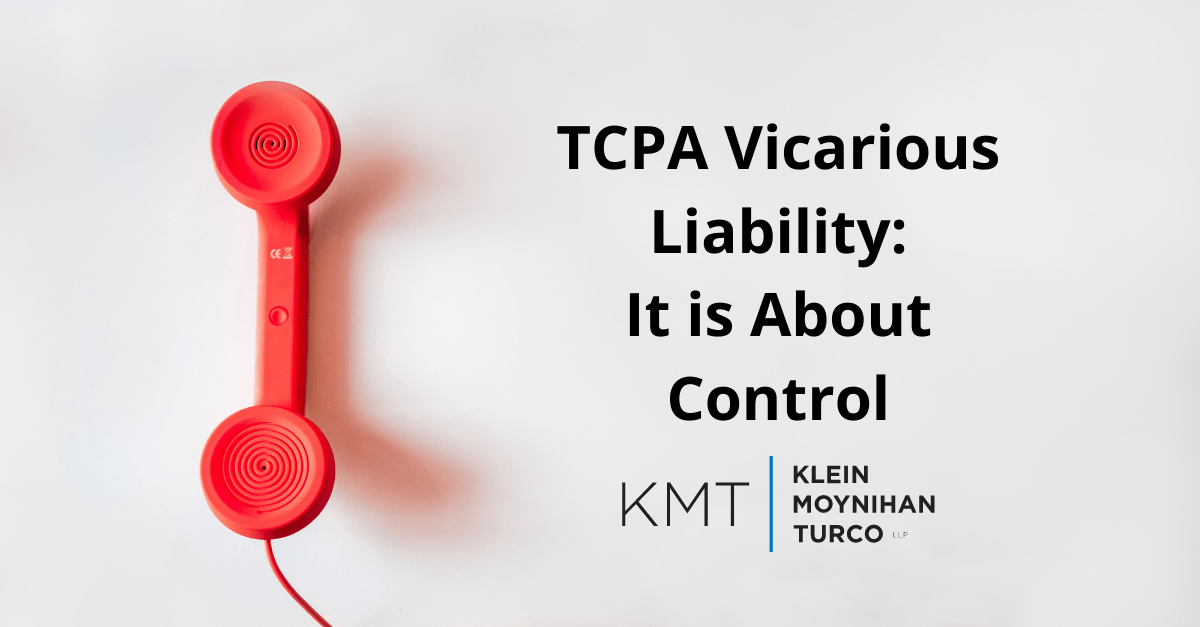Recently, an Arizona federal district court dismissed Telephone Consumer Protection Act (“TCPA”) claims against a Florida-based cruise ship company. The Court based its decision on the plaintiff’s failure to prove that the cruise ship company either sent the allegedly offending text messages itself or had an agent send them on its behalf. This latter, agency-based, theory of liability is known as TCPA vicarious liability, a legal theory where a company may be held responsible for text messages (or certain telephone calls) that third parties send (or place) for them. As our readers know, we regularly write about the latest TCPA developments (e.g., Personal TCPA Liability for Corporate Officers). The Arizona case that is the subject of this blog is Winters v. Grand Caribbean Cruises, Inc., Case No. 20-cv-00168-PHX-DWL (District of Ariz. Feb. 11, 2021).
What is vicarious liability?
TCPA vicarious liability requires proof of control
Courts recognize two types of TCPA liability: direct and vicarious. Direct liability applies to the party that sends a text message or places a telephone call that violates the TCPA. (Does the TCPA Apply to Text Messages?). Vicarious liability, on the other hand, applies to the party who controlled when and how the text message got sent or the call got placed. In order to prove vicarious liability, a plaintiff must submit evidence of an agency relationship. By nature, agency relationships are narrow, and confined to where the principal exerts direct control over the agent’s activities.
Finding an agency relationship is not a cut and dry or automatic proposition. Direct liability requires control by the party who actually sends the text message or makes the telephone call. Likewise, control is the key element in an agency relationship for TCPA vicarious liability – control of when and how the agent sends the text message or makes the telephone call. (Seventh Circuit Limits Agency Liability in TCPA Class Action).
In the Winters case, the Court found that the plaintiff did not prove either direct action by Grand Caribbean or an agency relationship with the third party who sent Winters the text messages at issue in the proceeding. The key element of control was missing, namely: 1) control over the transmission of the messages; or 2) control over the person that sent the text messages.
What does the Winters decision tell us about avoiding TCPA vicarious liability?
The Winters decision was largely based on pleading deficiencies and lack of proof. Specifically, Winters’s complaint was unclear as to which type of liability theory applied to his claims against Grand Caribbean. Plaintiffs can plead that both direct and/or vicarious liability exists in a TCPA cause of action, but defendants can often overcome those pleadings with more specific factual information – e.g., that the company did not physically send the subject text messages or that the company did not have the requisite level of control over the actual sender to establish an agency relationship. How vicarious liability applies in the world of marketer-publisher relationships is, as yet, unclear. At least one appellate court has found that the lack of evidence to support that a marketing company controlled a third-party publisher was fatal to a claim in a CAN-SPAM Act case, an analogous statute that applies to the transmission of commercial email. See XMission, L.C. v. Fluent, Inc., 955 F.3d 833 (10th Cir. 2020). The XMission case may concern a different consumer protection law, but it is useful for companies seeking to rebut allegations of vicarious liability.
Avoid Litigation with a Team of TCPA Attorneys
The outcome of TCPA litigation can be hard to predict. Companies have myriad options available to them on how to structure their telemarketing activities – direct action, using a dedicated agent, or using third-party publishers. With so many variables and differences, companies must rely on sound telemarketing practices and procedures to maintain compliance with the TCPA and other state and federal laws. The experienced defense attorneys at Klein Moynihan Turco can provide the kind of advice that will help keep you out of costly and time-consuming TCPA litigation. If you need help evaluating or updating your telemarketing practices and procedures, please email us at info@kleinmoynihan.com or call us at (212) 246-0900.
The material contained herein is provided for informational purposes only and is not legal advice, nor is it a substitute for obtaining legal advice from an attorney. Each situation is unique, and you should not act or rely on any information contained herein without seeking the advice of an experienced attorney.
Attorney Advertising
Protect Yourself from TCPA Litigation




